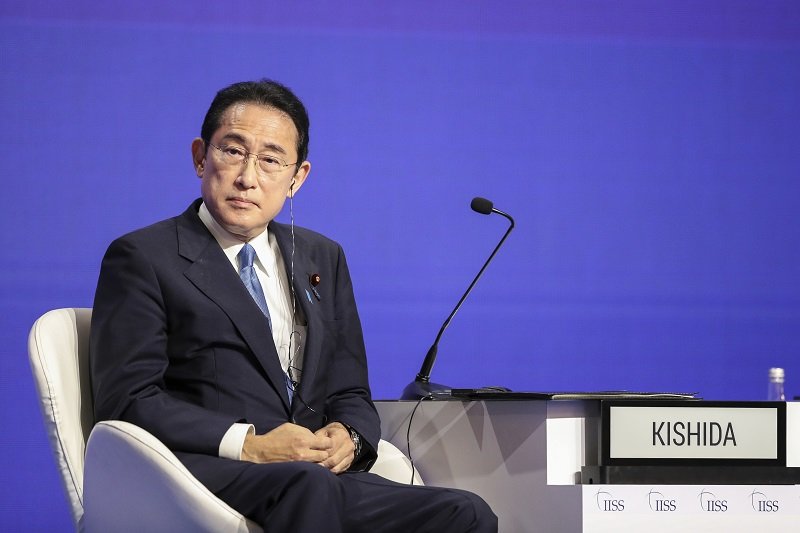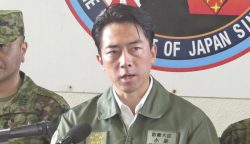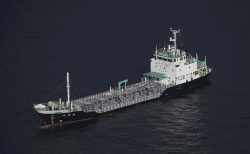
Prime Minister Fumio Kishida listens to the opening remarks of the forum on the interpretation device during the 19th International Institute for Strategic Studies (IISS) Shangri-la Dialogue in Singapore on Friday.
20:00 JST, June 11, 2022
SINGAPORE — At the Shangri-La Dialogue, a key Asian security meeting that opened in Singapore on Friday, Prime Minister Fumio Kishida made clear, with China in mind, Japan’s stance of not accepting any unilateral attempts to “change the status quo by force.”
In light of Russia’s aggression against Ukraine, he showed Japan’s determination to take the lead in contributing to maintaining the rules-based order in the Indo-Pacific region, calling for wide-ranging collaboration among countries, including those of the Association of Southeast Asian Nations (ASEAN).
‘Strong sense of urgency’
“Will we return to a lawless world where rules are ignored and broken, where unilateral changes to the status quo by force are unchallenged and accepted, and where the strong coerce the weak militarily or economically?”
Kishida posed the questions to national defense and security officials from Asia and Europe who gathered for the meeting at a Singapore hotel on Friday night.
While referring to the situations in the East and South China Seas, where China has been intensifying its maritime advances, and the nuclear and missile development programs conducted by North Korea, Kishida declared, “I myself have a strong sense of urgency that ‘Ukraine today may be East Asia tomorrow.’”
To maintain peace in the region, Kishida declared, “We will elevate a Free and Open Indo-Pacific to the next stage.”
The Free and Open Indo-Pacific is an initiative that former Prime Minister Shinzo Abe advocated in 2016. It promotes values such as the rule of law, peaceful settlement of disputes and freedom of navigation.
In his speech, Kishida explained: “Sharing a common grand vision, like-minded partners are each taking action on their own initiative, not at the behest of others. This is the very concept of a Free and Open Indo-Pacific.” In saying so, he stressed its difference from the approach taken by China, whose coercive tendency is conspicuous.
No allegiance test
ASEAN, which plays a significant role in the region, has strong trade and economic ties with China. ASEAN members include countries such as Cambodia and Laos, which show an overt pro-China attitude. To broaden the circle of collaboration on the Free and Open Indo-Pacific, Japan attaches importance to “enabling a broad range of countries to join in without testing them on their ‘allegiance’ to China,” as a senior Foreign Ministry official has put it.
In his address, Kishida promised, as a specific effort to promote the Free and Open Indo-Pacific, that Japan will promote efforts to train at least 800 maritime security personnel to strengthen the maritime law enforcement capabilities of at least 20 countries over the next three years.
In the area of economic security, Kishida said Japan will support more than 100 supply chain resilience projects over the next five years.
Expectations on Japan
The administration of U.S. President Joe Biden is also attempting to reinforce its ASEAN ties. On Saturday, U.S. Secretary of Defense Lloyd Austin made a speech at the meeting and was to hold talks with his counterparts from other countries. Following the meeting, he will also visit Thailand. A high-ranking official of the U.S. Department of Defense said that these efforts are aimed at displaying once again the U.S. position of promoting a Free and Open Indo-Pacific, together with its allies and others.
During a U.S.-ASEAN special summit in May, the Biden administration announced $150 million worth of assistance measures to strengthen U.S.-ASEAN cooperation, including the dispatch of personnel and vessels from the U.S. Coast Guard. The administration also announced that an official had been nominated to serve as U.S. ambassador to ASEAN, a post that has been vacant since 2017.
Former U.S. President Donald Trump was repeatedly absent from ASEAN-related summits, which was seen by some as “taking ASEAN lightly.” Meanwhile, China was deepening its initiatives in the region, including the Belt and Road scheme for creating an economic zone. The Biden administration hopes to recover from this setback.
As for the Indo-Pacific Economic Framework (IPEF), a new economic initiative launched with U.S. leadership, Japanese diplomacy has contributed greatly to seven ASEAN members deciding to join the framework, according to a diplomatic source in Washington. The United States counts highly on Japan to act as an “intermediary” between the United States and ASEAN.
Top Articles in Politics
-

LDP Wins Historic Landslide Victory
-

LDP Wins Landslide Victory, Secures Single-party Majority; Ruling Coalition with JIP Poised to Secure Over 300 seats (UPDATE 1)
-

Japan Tourism Agency Calls for Strengthening Measures Against Overtourism
-

CRA Leadership Election Will Center on Party Rebuilding; Lower House Defeat Leaves Divisions among Former CDPJ, Komeito Members
-

Voters Using AI to Choose Candidates in Japan’s Upcoming General Election; ChatGPT, Other AI Services Found Providing Incorrect Information
JN ACCESS RANKING
-

Japan Institute to Use Domestic Commercial Optical Lattice Clock to Set Japan Standard Time
-

Israeli Ambassador to Japan Speaks about Japan’s Role in the Reconstruction of Gaza
-

Man Infected with Measles May Have Come in Contact with Many People in Tokyo, Went to Store, Restaurant Around When Symptoms Emerged
-

Prudential Life Insurance Plans to Fully Compensate for Damages Caused by Fraudulent Actions Without Waiting for Third-Party Committee Review
-

Woman with Measles Visited Hospital in Tokyo Multiple Times Before Being Diagnosed with Disease























